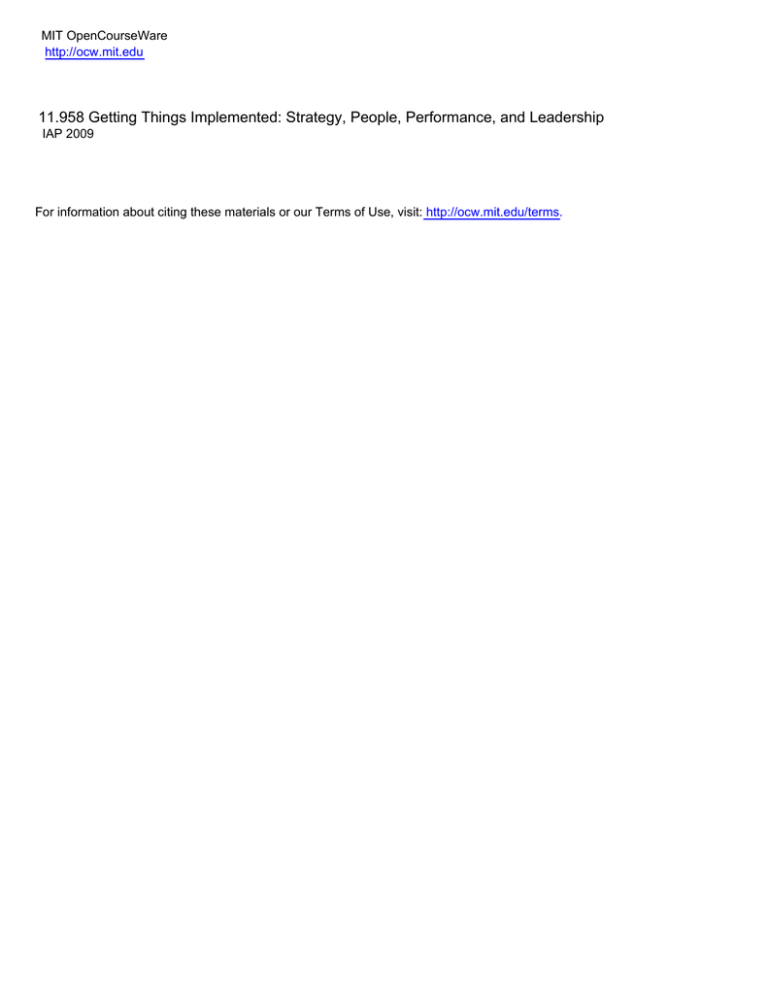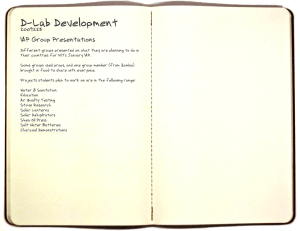11.958 Getting Things Implemented: Strategy, People, Performance, and Leadership MIT OpenCourseWare
advertisement

MIT OpenCourseWare http://ocw.mit.edu 11.958 Getting Things Implemented: Strategy, People, Performance, and Leadership IAP 2009 For information about citing these materials or our Terms of Use, visit: http://ocw.mit.edu/terms. Getting Things Implemented (IAP 2009) Reading Tips and Study Questions: DAY FIVE—JANUARY 9TH Required reading Discussion A (Thinking like an implementer): Recognizing implementation challenges and opportunities, visioning backward and forward, drawing on multiple frameworks. (Case) Mayor Purcell and the Faith Community Confront Nashville’s Housing Needs Discussion B (Leading change): Leadership versus authority, leading versus managing, mental models and effort, leadership styles. (Case: We will draw on several cases we have discussed this week.) Ronald Heifetz and Marty Linsky, Leadership on the Line, Boston: HBS Press, 2002, pp. 13-30. Daniel Goleman, “Leadership that Gets Results,” Harvard Business Review, March-April 2000. Overview The first half of our work today is about drawing on the multiple frameworks we’ve discussed across the week to recognize distinct implementation challenges for what they are, as part of addressing them. Beyond helping us synthesize the week’s concepts, this first half has immediate application: It prepares you for the kind of problem recognition you will need to do in order to complete the problem set due next week. That is, the problems in that set won’t say “apply framework X here.” Using clues in each word problem, you will need to decide which concepts apply and then apply them. The second half of the day, also the finale of the course, is about exercising leadership—an activity that is particularly important for motivating adaptation and risk taking, and thus deep change, in how implementation systems work. Questions for preparing the final case: 1. Affordable or “social” housing can be expensive to create, difficult to manage, unwanted by the neighborhoods that receive it, unpopular with politicians, reviled by the residents who lived in it, and other negative things. Thinking about the case of Mayor Purcell and his city—in basic terms you could explain to someone who is not a housing specialist—what does the Nashville community need to make progress on its affordable housing challenge? That is, what are the “ingredients” or elements that must fall into place? Page 1 of 2 Getting Things Implemented (IAP 2009) 2. What conceptual tools we have covered this week—value creation, political management, organizational strategy, collaboration, performance management, organizational design and process redesign, human resource management—help you think more clearly about those elements and how to pull them together to get things done? Try “mapping forward” from the institutional and other resources Nashville already has, but also trying “mapping backward” from some ideal outcome through the mechanisms and intermediate steps it would take to create that future (since some of the needed institutions or other resources may not yet exist). 3. As for the role of faith institutions in particular, what are the trade-offs between these institutions playing “producer” roles (e.g. developing or managing new housing) and their playing other roles that might help address affordable housing needs? Questions for the leading change discussion: 1. Thinking about Heifetz and Linsky’s distinction between “technical” and “adaptive” challenges, what are Mayor Purcell’s adaptive challenges? How might he and others best use their authority as a resource for leadership? 2. Do some self-assessment: Now considering Goleman’s article, what aspects of emotional intelligence do you feel you have most developed, and what aspects do you most need to work on? Assume that none of us can “have it all,” and think about the kinds of professional and personal situations you want to be more effective in. 3. What leadership styles are you most comfortable practicing (yourself), and which are least comfortable practicing? How about the styles of others (those trying to influence you): Which do you respond best to, and which do you respond worst to? Page 2 of 2
